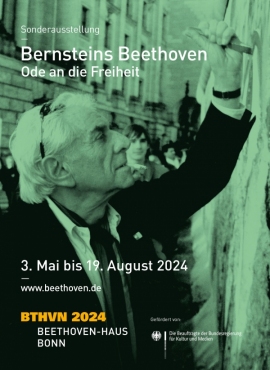Latest News
Bernstein's Beethoven – Ode to Freedom
Posted May 6, 2024
ODE TO FREEDOM
Special exhibition at the Beethoven-Haus shows Leonard Bernstein as outstanding Beethoven Ambassador
>
Image Source: Beethoven-Haus Bonn
BTHVN2024 – 200 years of the Ninth Symphony
Special Exhibition at the museum
Bernstein's Beethoven – Ode to Freedom
May 3 to August 19, 2024
At Christmas 1989, the American conductor Leonard Bernstein wrote music history when he performed Beethoven's Ninth Symphony in East and West Berlin shortly after the fall of the Berlin Wall with a slightly different text as an ‘Ode to Freedom’. The Beethoven-Haus Bonn commemorates these legendary concerts in a special exhibition that shows Bernstein's complex engagement with Beethoven and honours him as an outstanding Beethoven ambassador. The opening of the exhibition, which is sponsored by the Federal Government Commissioner for Culture and the Media, is also attended by Bernstein's daughter, author and producer Jamie Bernstein, who travelled from the United States.
With 100 objects, the multimedia exhibition traces how Bernstein's thoughts and actions as an author, pianist, television producer and composer repeatedly revolved around the Bonn composer - from his early texts in the 1940s to his final public concert at Tanglewood in 1990. This lifelong engagement culminated in the 1989 Christmas concerts. The exhibition was curated by Malte Boecker, Director of the Beethoven-Haus Bonn, and Arnd Richter, editor at WDR and Bernstein specialist.
The exhibits were mainly made available from the US. They explore Bernstein's complex relationship with Beethoven as a composer, performer, charismatic communicator and socio-political activist. Numerous videos and audio documents invite the audience to form their impression of Leonard Bernstein's significance as a passionate Beethoven ambassador. ‘Bernstein's winning personality and early media presence make him one of the outstanding Beethoven ambassadors of the 20th century. Thanks to many international loans, we are delighted to show Bernstein's view of Beethoven in all its complexity for the first time. It is still fascinating to see how Bernstein talks about Beethoven, how he interprets and presents him,’ says Malte Boecker.
While Beethoven's music was generally an expression of the deepest humanity and freedom for Bernstein, the 9th Symphony was of particular importance to him. He repeatedly placed it at the centre of concerts of great political relevance - including the legendary concerts in Berlin after the fall of the Berlin Wall at Christmas 1989. The television broadcast in 21 countries reached over 100 million viewers. The exhibition presents Bernstein's performance score with the adjusted text ‘Freiheit’ (‘Freedom’) instead of ‘Freude’ (‘Joy’) and the notes he made on the text changes. The historic performance can be relived in sound and vision in the museum's music room. Photos document how Bernstein himself became a ‘wall-pecker’ after the concert. He borrowed a hammer and chisel from a young boy whose family loaned the tools for the exhibition. One of Bernstein's small pieces of the Wall is also on display. The experience found a poetic echo in the poem ‘Christmas in Berlin, 1989’.
Beethoven was one of Bernstein's formative leading figures. His close bond is particularly evident in the ritual of ‘shaking hands’ with the Beethoven sculpture in the Vienna Musikverein, as a photo shows. Several documents in the exhibition illustrate the humorous play with names: On an envelope of an autograph Beethoven letter in the Beethoven-Haus, Bernstein left the signature ‘LB (unfortunately not van)’ during a visit in 1989, and on the exhibition poster for the presentation of Andy Warhol's Beethoven series in Bonn, he signed ‘Leonard van Bernstein’ alongside the composer's name. He even signed the song ‘There Had to be a Revolution’ with the pseudonym ‘Lenny Beethoven’. Two examples prove that Bernstein was also inspired by Beethoven in his compositions: The manuscripts of the two works, the second ‘Meditation’ from the ‘Mass’ and the song ‘Somewhere’ from ‘West Side Story’, can be seen in facsimiles.
As an outstanding communicator, Bernstein addressed a broad public and played a leading role in the field of music education with his media presence in the emerging media age. As early as the 1940s, he dealt with Beethoven in the fictional dialogue text ‘On a road trip through the Rocky Mountains’ and developed the basic ideas that were to become the central theme of his view of Beethoven (and also of the exhibition). He felt that Beethoven's compositions were characterised by their inner consistency: Only with Beethoven, he says, does one have the feeling that every note that follows the previous one is the only right choice at this point and in this context. Bernstein continued to expand on this idea in the 1950s and 1960s in various media-effective television programmes: for example in the groundbreaking Omnibus programme of 1954, where he explained Beethoven's 5th Symphony standing on an oversized score, or in 1968 in the family concert ‘Forever Beethoven!’ in the New York Philharmonic Orchestra's ‘Young People's Concerts’ series. How Bernstein inspired his audience can be experienced by excerpts from the programmes.
Various concert posters and programmes illustrate that Bernstein frequently conducted works by Beethoven throughout his life and even appeared as a pianist himself with the 1st Piano Concerto, including the 1989 Bonn Beethoven Festival, where Bernstein was an Artist in Residence. Touching is the programme booklet and an excerpt from the recording of his last concert, which Leonard Bernstein gave in Tanglewood a few weeks before his death in 1990 performing the 7th Symphony, which he held in particularly high esteem.
The exhibition is accompanied by a brochure with detailed background information and descriptions of the exhibits.
Opening hours of the museum:
Wed to Mon – 10 a.m.-6 p.m. (CEST)
Lenders to the exhibition:
Indiana University Jacobs School of Music, New York Philharmonic Archive, Boston Symphony Orchestra Archives, Historisches Archiv der Wiener Philharmoniker, Torsten Haferlach, Rolf Kranke, Andreas Meyer-Schwickerath, Arnd Richter, Malte Boecker, Julia Kluxen-Ayissi, Craig Urquhart und das Leonard Bernstein Office, Library of Congress Music Division